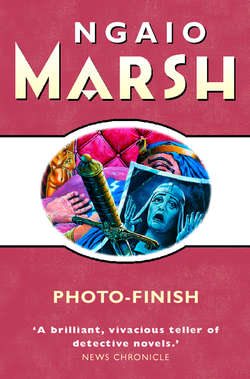Читать книгу Photo-Finish - Ngaio Marsh, Stella Duffy - Страница 9
IV
ОглавлениеAs far as his nearest associates could discover Mr Reece was not profoundly disturbed by his mistress’s goings-on. Indeed he appeared to ignore them but, really, it was impossible to tell, he was so remarkably uncommunicative. Much of his time, most of it, in fact, was spent with a secretary, manipulating, it was widely conjectured, the Stock Markets and receiving long-distance telephone calls. His manner towards Rupert Bartholomew was precisely the same as his manner towards the rest of the Sommita’s following: so neutral that it could scarcely be called a manner at all. Occasionally when Rupert thought of Mr Reece he was troubled by stabs of uncomfortable speculation, but he was too far gone in incredulous rapture to be greatly concerned.
It was at this juncture that Mr Reece flew to New Zealand to inspect his island lodge, now completed.
On his return, three days later, to Melbourne, he found the Alleyns’ letters of acceptance and the Sommita in a high state of excitement.
‘Dar-leeng,’ she said, ‘you will show me everything. You have photographs, of course? Am I going to be pleased? Because I must tell you I have great plans. But such plans!’ cried the Sommita and made mysterious gestures. ‘You will never guess.’
‘What are they?’ he asked in his flat-voiced way.
‘Ah-ah!’ she teased. ‘You must be patient. First the pictures which Rupert, too, must see. Quick, quick, the pictures.’
She opened the bedroom door into the sitting room and in two glorious notes sang, ‘Rupert!’
Rupert had been coping with her fan mail. When he came in he found that Mr Reece had laid out a number of glossy coloured photographs on the bed. They were all of the island lodge.
The Sommita was enchanted. She exclaimed, purred, exulted. Several times she burst into laughter. Ben Ruby arrived and the photographs were re-exhibited. She embraced all three men severally and more or less together.
And then with a sudden drop into the practical she said, ‘The music room. Let me see it again. Yes. How big is it?’
‘From memory,’ said Mr Reece, ‘sixty feet long and forty wide.’ Mr Ruby whistled. ‘That’s quite a size,’ he remarked. ‘That’s more like a bijou theatre than a room. You settling to give concerts, honey?’
‘Better than that!’ she cried. ‘Didn’t I tell you, Monty my darleeng, that we have made plans. Ah, we have cooked up such plans, Rupert and I. Haven’t we, caro? Yes?’
‘Yes,’ Rupert said with an uncertain glance at Mr Reece. ‘I mean – Marvellous.’
Mr Reece had an extremely passive face but Rupert thought he detected a shade of resignation pass over it. Mr Ruby, however, wore an expression of the deepest apprehension.
The Sommita flung her right arm magnificently across Rupert’s shoulders. ‘This dear child,’ she said and if she had made it: ‘this adorable lover’ she could have scarcely been more explicit, ‘has genius. I tell you – I who know. Genius.’ They said nothing and she continued. ‘I have lived with his opera. I have studied his opera. I have studied the leading role. The “Ruth". The arias, the solos, the duets – there are two – and the ensembles. All, but all, have the unmistakable stigmata of genius. I do not,’ she amended, ‘use the word “stigmata” in the sense of martyrdom. Better, perhaps, to say “they bear the banner of genius". Genius!’ she shouted.
To look at Rupert at this moment one might have thought that ‘martyrdom’ was, after all, the more appropriate word. His face was dark red and he shifted in her embrace. She shook him, none too gently. ‘Clever, clever one,’ she said and kissed him noisily.
‘Are we to hear your plan?’ Mr Reece asked.
The hour being seven o’clock she hustled them into the sitting room and told Rupert to produce cocktails. He was glad to secrete himself in the chilly cabinet provided for drinks, ice and glasses. A few desultory and inaudible remarks came from the other three. Mr Ruby cleared his throat once or twice. Then, so unexpectedly that Rupert spilt Mr Reece’s whisky and soda over his hands, the piano in the sitting room sketched the opening statement of what he had hoped would be the big aria from his opera: and the superb voice, in heart-rending pianissimo, sang: ‘Alone, alone amidst the alien corn.’
It was at that moment with no warning at all that Rupert was visited by a catastrophic certainty. He had been mistaken in his opera. Not even the most glorious voice in all the world could ever make it anything but what it was – third rate.
It’s no good, he thought. It is ridiculously commonplace. And then: She has no judgement. She is not a musical woman.
He was shattered.
